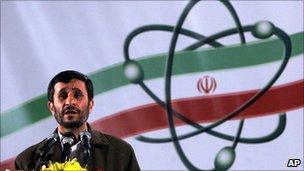Stuxnet 'hit' Iran nuclear plans
- Published

The Stuxnet worm might be partly responsible for delays in Iran's nuclear programme, says a former UN nuclear inspections official.
Olli Heinonen, deputy director at the UN's nuclear watchdog until August, said the virus might be behind Iran's problems with uranium enrichment.
Discovered in June, Stuxnet is the first worm to target control systems found in industrial plants.
Iran has denied that delays to its nuclear plans were caused by Stuxnet.
Technical problems
Interviewed by Reuters, Mr Heinonen said there were many reasons for the ongoing delays at Iran's Natanz uranium enrichment plant - a key part of the nuclear power generation process.
Uranium is typically enriched or concentrated by being spun in centrifuges at high speed.
Mr Heinonen said the technical complexity of creating centrifuges had also contributed to the delays in Iran's nuclear programme.
"One of the reasons is the basic design of this centrifuge... this is not that solid," said Mr Heinonen, a former deputy director at the International Atomic Energy Agency (IAEA).
Quizzed about whether Stuxnet could have contributed to the delays, he said: "Sure, this could be one of the reasons... there is no evidence that it was, but there has been quite a lot of malfunctioning centrifuges."
Analysis carried out by security firm Symantec shows that a Stuxnet-infected controller in an industrial plant would make the devices it was connected to run at very high speeds almost indefinitely.
Symantec's research also suggests that Stuxnet was designed to hit motors controlling centrifuges and thus disrupt the creation of uranium fuel pellets.
Figures gathered by security firms show that 60% of all the infections caused by Stuxnet were on machines in Iran.
An IAEA report released in September shows that about 160 centrifuges in Iran's nuclear plants had been taken offline in only a couple of months. No reasons were given for the devices being shut down.
However, Iran has always denied that the Stuxnet worm had anything to do with the ongoing delays to its nuclear power programme. Iran's Bushehr nuclear power plant is due to start generating power in January 2011, two months later than originally planned.
- Published19 November 2010
- Published2 October 2010
- Published26 September 2010
- Published23 September 2010
- Published30 September 2010